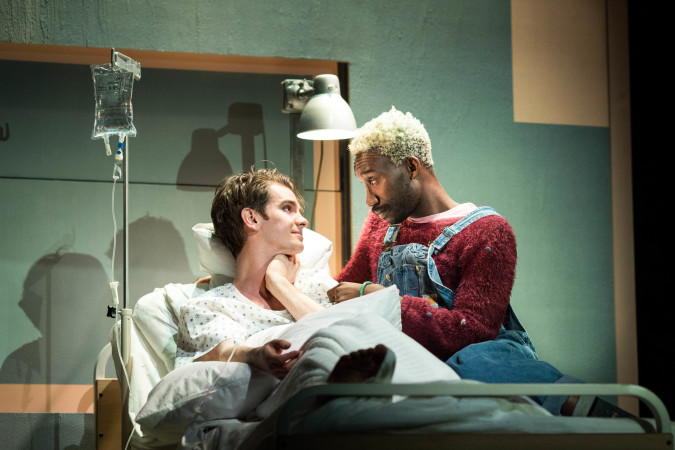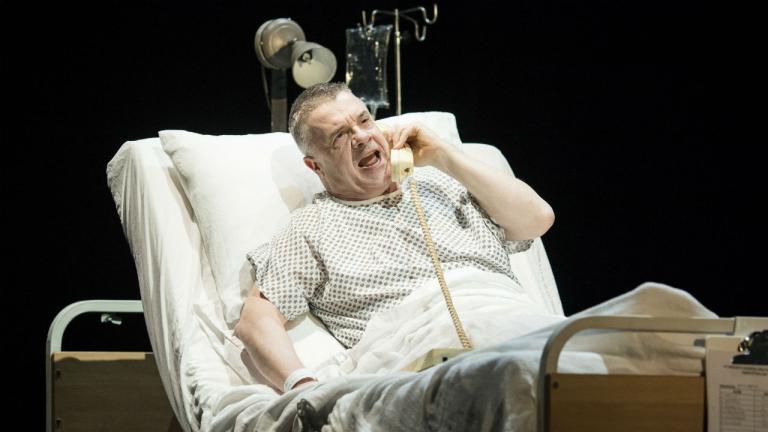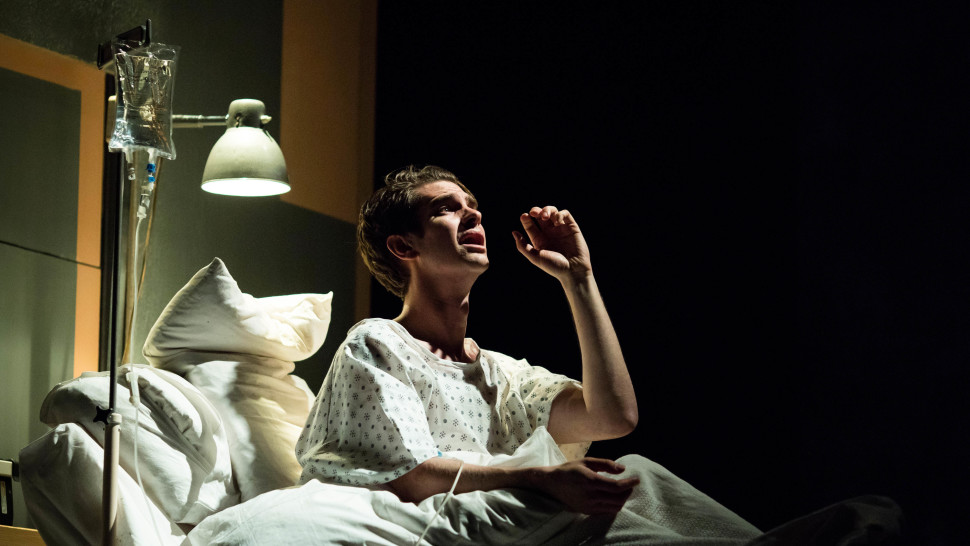by Sean Donovan

Roy Cohn, the devilish super-lawyer towering over Tony Kushner’s epic two-part play Angels in America, is introduced to the audience at his favorite place, his office telephone, shifting between various calls, screaming at his clients and associates, and relishing his position of supreme power and influence. In between calls he leans over to his protégé, closeted Mormon lawyer Joe Pitt, and remarks
I wish I was an octopus, a fucking octopus. Eight loving arms and all those suckers, know what I mean?”

At face value Roy is talking about needing the extra limbs to deal with all his callers at once, and certainly this is how Al Pacino played the line in the widely seen HBO miniseries rendition of Angels in America. But embodied here by Nathan Lane, in the British National Theater’s revival of the play, currently playing in theaters around the United States through Fathom Events, the superb actor adds a flirtatious curve to the word “suck.” Roy is practically winking at Joe, sneaking in homoerotic double entendre to their powerhouse of conservative political domination. Nathan Lane found a way to make moments gayer in one of the gayest plays in the American canon.
Al Pacino was fantastic in the HBO miniseries, bringing his signature ranting gravitas to a loathsome real-life figure, the lawyer whose outsized ambition and greed led him to play a decisive role in anti-communist witch hunts and conservative politics for much of the mid-twentieth century. But Roy Cohn was also living something of a double life, not exactly ‘out’ as a gay man by any twenty-first century standard, but frequently having sex with men; an open secret amongst the wealthy and powerful. As Roy says to his doctor in a speech denying any characterization of himself as homosexual or a person with AIDS:
I have sex with men. But unlike nearly every other man of whom this is true, I bring the guy I’m screwing to the White House and President Reagan smiles at us and shakes his hand.”
Al Pacino played Roy as a hollowed-out corpse, self-loathing to the point that his queerness was almost buried inaccessible inside him, while Nathan Lane takes an utterly different tack. Lane’s Roy exists inside a gay world and knows its languages; despite maintaining a respectable outer appearance of straightness, Lane grants the audience access to an evil man who nonetheless lived a tense life in the unstable regions between straight and gay worlds. It’s a remarkable achievement, emphasizing the queerness and tragedy of a character that threatens to be lost in Pacino types growling out Pacino-style monologues. Nathan Lane has always been cast in the most stereotypical roles and has woven the most beautiful characters out of them, gay men who find strength and love in embracing the feminine (The Birdcage being the masterclass example). To see Lane continue to find ways to honor his femme panache, through one of the most monstrous closeted characters of literature, is well worth the entire price of admission.

Beyond Lane, this revival of Angels in America rides solidly off the incontestable strength of its source material, without expending too much energy to reinvent the wheel. The epic tale (too long to recount here; hell, it’s too long for one play) careens across two men struggling with AIDS in the most apocalyptic years of the AIDS crisis in the Reagan-dominated United States, Roy and Prior Walter, played here by Andrew Garfield.
With the mountains of bad press from his “gay without the physical act” comment, one would love, as an apology, to find in Garfield’s work the kind of nuance and sensitivity that overflows from Lane’s performance. Unfortunately, Lane is as lively as Garfield is wooden, drawing from the most simplistic gay stereotypes that bring to mind his similarly shallow work in the early “good ol’ southern boy” scenes of Hacksaw Ridge. Prior is a theatrical character but he uses his theatricality to buoy and strengthen himself. In Garfield’s caricature one gets the impression that he just believes this is what gay men are, that flamboyant theatricality is not informed by any kind of logic or history, not used for any kind of purpose, it’s just a fact of existence.
The rest of the cast does good to adequate work, but the widely seen performances from the HBO miniseries linger. Patrick Wilson and Jeffrey Wright so thoroughly owned their characterizations of, respectively, repressed lawyer Joe Pitt and resilient nurse Belize, that their successors here, Russell Tovey and Nathan Stewart-Jarrett, have a tough time truly distinguishing themselves. Mary-Louise Parker gave the greatest performance of her career for the HBO miniseries as Joe’s wife Harper, an agoraphobe with unspecified mental illness, marked by frequent hallucinations. Harper is perhaps the best and most challenging character of the play, given some of Tony Kushner’s most majestic speeches and ideas to communicate. Denise Gough more than steps up to the plate, crafting a beautiful rendition of the character, if one that struggles to share the spotlight with a production more focused on Prior and Roy, and doesn’t demand the immediate awe that Mary-Louise Parker inspired.
Susan Brown has the unique disadvantage of following-up on characters portrayed by Meryl Streep in the HBO series, including the ghost of Ethel Rosenberg, haunting Roy to his death, and Joe Pitt’s mother Hannah. Streep’s inherent star power magnified her presence in the miniseries, and made Ethel in particular feel like a major character. And though Brown’s more minimal work is in keeping with the true supporting status of her roles, it doesn’t stop the viewer from wanting a little bit more.
The key for the production is largely minimalism, with little props and only a few moving walls to signify the different spaces of the characters. The walls, artfully, are used less and less, particularly in part two of the play, as the characters are forced together by fate. Everything takes a back seat to the prose, as if the production was afraid to overwhelm or distract the text. But as a devout lover of Angels in America, these six hours were a dream. What more can I ask for than to be led slowly through the richness of this queer utopia of a play?
